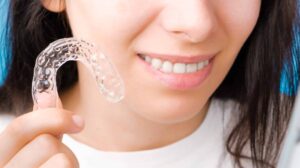As you grow older, your teeth will experience a number of changes. Some of these changes are simply a result of the natural aging process, while others may be due to lifestyle choices or health conditions. In this blog post, we will discuss some of the most common effects of aging on teeth. We will also provide some helpful tips for keeping your teeth healthy and looking their best as you get older!
The physical effects of aging on teeth
When we chew on anything, our enamel becomes thinner and gradually wears down. In addition, teeth that are older become softer and therefore have a greater chance of breaking. Gum tissue also becomes thinner as we get older. Your teeth ultimately become more susceptible to cavities if the gum tissue is removed from around them.
Changes in oral health as you age
As we age, our risk of developing various oral health conditions increases. For example, gum disease is more common in older adults. Oral cancer also becomes more prevalent as we get older. In addition, tooth decay and other dental problems are more likely to occur in seniors.
Tooth loss in seniors
Tooth loss is a common problem among older adults. In fact, by the age of 65, most seniors have lost at least one tooth. There are several reasons why tooth loss occurs more frequently in older adults.
Dentists can help seniors with their ongoing dental care by treating these issues early on and preventing them from becoming bigger problems.
For instance, the gums may recede due to gum disease or other oral health conditions. In addition, the roots of teeth may become exposed as the jawbone begins to shrink. As a result, teeth may become loose and eventually fall out.
Jaw bone loss with age
As we grow older it is more and more likely we will lose teeth for a variety of reasons, from physical trauma, to other oral health issues. When we lose teeth, the jaw bone deteriorates since it no longer has something to hold onto. This can ultimately lead to a sunken appearance on the face and make us look older than we actually are.
Age-related gum recession
Gum recession or receding gums is when the tissue that surrounds your teeth pulls away. This can happen because the tissue becomes thin and worn down over time, or because of other health conditions. When the gums recede, it exposes more of the tooth’s surface. This makes the teeth more susceptible to decay and can also lead to bone loss in the jaw.
How your oral health indicates your general health
Your health is directly affected by your well-being. Gum inflammation has been linked to a variety of serious health problems like diabetes, cardiovascular disease, strokes, high blood pressure and breathing issues, all of which are more common as we age. Scientists think gum illness may be triggered when germs from gum infections enter the circulation and cause harm. Your mouth It’s like the “canary in the coal mine” for the rest of your body. If your mouth is unhealthy, then you’re likely to be heading towards some other significant health problems too. Conversely, if you have healthy teeth and gums and then you’re likely to have fewer health issues as you get older too. So it’s important to keep your oral health in check, as it can be an indicator of your overall health.
Signs that you may have an unhealthy mouth
If you have any of the following symptoms, it may be an indication that your mouth is not as healthy as it should be:
- Bad breath that doesn’t go away after brushing your teeth
- Dry mouth
- White spots on your gums
- Receding gums
- Tooth loss
- A change in the fit of your dentures
- Gums that are red, swollen, or bleed easily
- Mouth sores or lesions
- Changes in the way your teeth fit together when you bite
- Pain or discomfort in your mouth
- Difficulty chewing, swallowing, or moving your tongue or jaw
If you are experiencing any of these symptoms, be sure to see your dentist as soon as possible. They will be able to help diagnose the problem and provide you with the necessary treatment.
How to care for your teeth as you get older
Now that we understand the importance of maintaining a healthy mouth as we get older, we need to have a strategy in place for ensuring that our aging mouth is in tip-top shape! Fortunately, there are a number of things you can do to keep your teeth healthy and look their best as you age. And for the most part, it’s basically the same type of action we recommend for people at all stages of life.
High-quality oral hygiene
This means brushing your teeth twice a day, flossing regularly, and using mouthwash. In addition, you should see your dentist for regular checkups and clean too.

If you’re not already using one we recommend the use of a high-quality electric toothbrush (with soft bristles of course) to ensure your teeth cleaning efforts are as effective as possible. If you have any dental problems, be sure to address them as soon as possible so they don’t become major problems.
Maintain a healthy diet
In addition to practicing good oral maintenance habits, it is also important to have a healthy diet. This means eating plenty of fruits and vegetables and avoiding sugary foods and drinks. Drinking plenty of water is also important for oral health. Acidic foods (like citrus fruits) can have a negative impact on oral health. This is because the acid can wear away at the enamel on your teeth, making them more susceptible to decay. It is important to limit your intake of acidic foods and drinks and to brush your teeth after eating them. Water helps to wash away food and bacteria that damages tooth enable and can cause cavities and other dental problems such as periodontal disease. So be sure to drink plenty of water throughout the day!
Avoid alcohol
Drinking alcohol can make your teeth weaker. If you have a drink, the alcohol will come in contact with your teeth and start to break down the natural minerals that are used to protect them. This means that they will have an increased risk of getting cavities and other dental problems such as periodontal disease.
Quit smoking
We know, we know. This is easier said than done. But if you want to keep your teeth healthy as you age, quitting smoking is one of the most important things you can do. Smoking and other tobacco products can also do damage to your teeth and gums, so be sure to avoid those as well. Smoking not only causes tooth decay and gum disease, but it also increases your risk for oral cancer. So if you want to keep your smile looking good for years to come, quitting smoking is a must.
See your dentist regularly
Finally, one of the most important things you can do to keep your teeth healthy as you age is to see your dentist regularly. Regular dental appointments are essential in order to maintain healthy teeth as you get older. Through the use of a dental care plan dentists can catch problems early on and treat them before they become bigger issues. They can also help you maintain good oral hygiene habits and give you tips on how to take care of your teeth as you age. So be sure to schedule regular dental checkups!
Common dental treatments and procedures for seniors
As we age, our teeth may become wobbly and eventually fall out due to physical trauma, other oral health issues, or jaw bone loss. When we lose teeth, the jaw bone deteriorates. There are a number of dental treatments and procedures that are commonly performed on seniors. Some of these include:
Dentures
A denture is a removable dental appliance that replaces missing teeth. Dentures are custom-made to fit your mouth and can be made from either plastic or metal.

Dental implants
Dental implants are artificial roots that are surgically implanted in the jaw bone. They are used to support dental prostheses such as dentures, bridges, or crowns.
Teeth whitening
Teeth whitening is a procedure that can be used to lighten the color of teeth. It is performed using either an over-the-counter product or in a dental office but the results are largely cosmetic in nature..
Dental bridge
A dental bridge is a fixed dental prosthesis that replaces missing teeth by bridging the gap between two adjacent teeth. The bridge is attached to the adjacent teeth using crowns, and it can be made from either plastic or metal.
Dental crown
A dental crown is a fixed dental prosthesis that covers the entire tooth. It is used to protect the tooth from further damage, restore its function, and improve its appearance. Crowns can be made from a variety of materials, including porcelain, ceramic, metal, or resin.
Root canal
A root canal is a procedure that is performed to save a tooth that has been damaged by decay or infection. The procedure involves removing the damaged oral tissues from the inside of the tooth, cleaning the tooth, and then filling it with a material called gutta-percha.
Frequently asked questions
Do your teeth wear down with age?
The teeth will deteriorate as a person ages, becoming softer and more fragile. A “normal” 59-year-old adult loses 10mm of teeth due to chewing friction at this age.
Why do older people have worse teeth?
Teeth with faulty teeth are likely to encounter more difficulties. Tissues on tooth surfaces are irritated or inflamed by cracks and breaks in the enamel. If you don’t detect the discomfort, it will develop rapidly if the nerves on your teeth lose sensitivity over time.
Frequently asked questions about aging teeth
Do older people have worse teeth?
Teeth with faulty teeth are likely to encounter more difficulties. Pulp tissues on tooth surfaces are irritated or inflamed by cracks and breaks in the enamel. If you don’t detect the discomfort, it will develop rapidly if the nerves on your teeth lose sensitivity over time.
What is the most common dental procedure for seniors?
The most common dental procedures for seniors include dentures, dental implants, teeth whitening, bridges, and crowns.
How does age affect your teeth?
The effects of aging on teeth can include tooth decay, gum disease, loose teeth, and jaw bone loss. Dentists can help seniors with their ongoing dental care by treating these issues early on and preventing them from becoming bigger problems. They can also help seniors maintain good oral hygiene habits and give them tips on how to take care of their teeth as they age. So be sure to schedule regular dental checkups!
Conclusion
As you age, it’s important to take care of your teeth and gums. The tips we’ve provided will help you stay healthy for years to come. Follow these simple steps to maintain optimal oral health as you age: Brush your teeth twice a day with fluoride toothpaste, and floss daily, visit your dentist for regular checkups and cleanings, and eat a balanced diet full of nutrient-rich foods. By following these guidelines, you can keep your smile looking good and feeling great well into old age. If you’re worried that you don’t quite have the healthy smile of your youth, contact our team of dental experts for your next checkup to discuss ways to ensure you keep your natural teeth for as long as possible.




